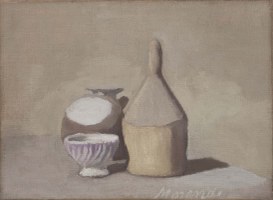Brazil – "O Legado de Giorgio Morandi"
On December 14, in Rio de Janeiro, opening of the exhibition O Legado de Giorgio Morandi (The Legacy of Giorgio Morandi) at the Centro Cultural Banco do Brasil, running until February 21, 2022.
It is the second Brazilian stage, after São Paulo, of an exhibition which presents a selection of works exclusively from the collection of the Museo Morandi in Bologna, the city where the artist was born and lived his whole life.
The Museo Morandi is the unique lender, with a loan of 25 works by the Istituzione Bologna Musei – 16 paintings, 6 etchings, 2 watercolors, and 1 drawing – and 8 works from private collections on free loan at the Museum.
“The exhibition path features a variety of diverse works that form a metric composed of continuous formal references and tonal variations, and bring to light the themes examined by Morandi from the beginnings to maturity: still life, flowers and landscapes, the privileged themes of his continuous search for new representative modalities and objects of an extremely modern inquiry about pictorial and graphic language and about the infinite possible relationships between volumes, space, light and colour”, highlights Gianfranco Maraniello, curator together with Alberto Salvadori.
O Legado de Giorgio Morandi is presented by the Brazilian Ministry of Tourism, BB DTVM and Banco do Brasil and was previously set in São Paulo (September 22-November 22) on the occasion of the 34th Bienal de São Paulo.
In 1957 the São Paulo Biennale awarded Morandi the Grand Prize for painting, in a context including the participation –among others– of Marc Chagall and Jackson Pollock, thanks to the jury chaired by the Director of MoMA Alfred Barr, who recognized the extraordinary nature of the Bolognese artist, projecting him into an international dimension.
The exhibition displays some works that Morandi himself had selected for his participation in the Biennale, like the Natura morta of 1948 (V. 625), and features works by contemporary artists who were inspired by his work, such as Josef Albers, Wayne Thiebaud, Franco Vimercati, Rachel Whiteread, and Lawrence Carroll.

